
What will the business school of the future look like? These leading business school professors have some ideas.
What should the business school of the future look like? Ask leading undergraduate professors, and they imagine a business school that focuses on experiential learning, one that incorporates entrepreneurial thinking into every lesson, and emphasizes ethical leadership and community engagement.
The ideal business school would weave interdisciplinary collaboration while training future business leaders to tackle the biggest challenges of our time: Think climate change, inequality, and social justice.
The business school of the future would create leaders that could reshape companies that work for the greater good, not just a greater bottom line.
“Companies need to recognize and reward employees’ hard work and dedication, invest in human resources and the right technology and tools to support productivity and innovation, and engage and meet the needs and expectations of all stakeholders, not just shareholders,” says Bright Asante-Appiah, Assistant Professor of Accounting at Lehigh University College of Business.
“Corporate directors’ relentless focus on maximizing shareholder wealth largely ignores other stakeholders and contributes to the growing inequality of income.”
Each year, as part of our 50 Best Undergraduate Business Professors compilation, Poets&Quants asks leading professors what they would like to see in the business school of the future. We’ve compiled a range of answers below.
Erik Noyes
Babson College

Noyes is an Associate Professor of Entrepreneurship at Babson College. His research examines entrepreneurship education, disruptive innovation, and AI. He is the founding Faculty Director of the Weissman Foundry, an interdisciplinary collaboration between Babson College, the Olin College of Engineering, and Wellesley College.
Business schools of the future should have more … “Great leaders and innovators are whole people, blending their humanity and business acumen. Top business schools of the future will have a palpable zeal for interdisciplinary thinking and interdisciplinary collaboration across their faculty and students alike. The emerging AI-age makes interdisciplinary thinking that much more important.”
Kyle D. S. Maclean
Western University, Ivey Business School
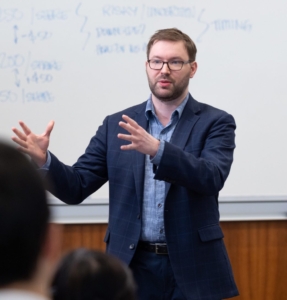 Maclean is Assistant Professor and Teaching Scholar at Western University’s Ivey Business School. His disciplinary research focuses on how to apply Revenue Management techniques to the live entertainment industry, asking how entertainment products become a success and how to engage in operational allocation and pricing decisions.
Maclean is Assistant Professor and Teaching Scholar at Western University’s Ivey Business School. His disciplinary research focuses on how to apply Revenue Management techniques to the live entertainment industry, asking how entertainment products become a success and how to engage in operational allocation and pricing decisions.
Business schools of the future should have more … “Experiential courses, designed around a live “model” business and in-class moments to contextualize and discuss what that business is going through.”
Sarah Wolfolds
Cornell University, Charles H. Dyson School of Applied Economics and Management
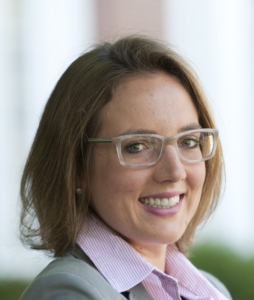
HBS Doctoral student Sarah Reynolds on campus in Boston August 26, 2014.
Wolfolds is Assistant Professor of Strategy in the Charles H. Dyson School of Applied Economics and Management at the Cornell SC Johnson College of Business. She was awarded the Dyson Outstanding Early Career Achievement award in 2019 and was the first non-dean to win the Dyson Distinguished Leadership and Service Award in 2023.
Wolfolds conducts research in nonmarket strategy and research methods; serves in professional leadership roles; and publishes research on applying econometric methods to answer key strategy questions.
Business schools of the future should have more … “Community engaged learning! That’s why I’m thrilled to be in a new role as faculty director of Dyson Grand Challenges program, where students engage in a four-year curriculum that culminates in a capstone project that addresses one of the U.N. sustainable development goals. This type of applied and engaged learning focusing on complex societal issues will become increasingly important in business schools in the future.”
Jingjing Li
University of Virginia, McIntire School of Commerce
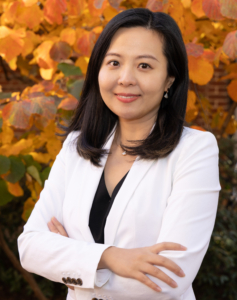 Li is Andersen Alumni Associate Professor of Commerce at University of Virginia McIntire School of Commerce. She is also Associate Director for the Center for Business Analytics.
Li is Andersen Alumni Associate Professor of Commerce at University of Virginia McIntire School of Commerce. She is also Associate Director for the Center for Business Analytics.
Her research interests relate to artificial intelligence and big data analytics, with applications in search engines, healthcare, marketing, platform, and public policy.
Business schools of the future should have more … “If I had my way, the future business school would significantly emphasize ethical leadership within a technologically advanced world. In an era of AI and emerging technologies, it’s essential for students to not only master cutting-edge tools but also understand their societal and business implications. Future business leaders must develop a solid ethical grounding to address the intricate moral challenges facing the rapid development of AI technologies.”
Bright Asante-Appiah
Lehigh University College of Business
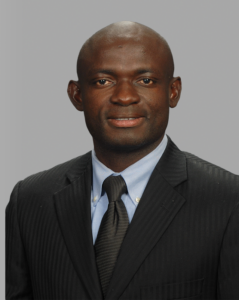 Asante-Appiah is Assistant Professor of Accounting at Lehigh University College of Business. He transitioned into academia after 10 years’ experience in public accounting and industry. His prior public accounting experience includes the “Big 4” firms, auditing SEC registrants in manufacturing, retail, communication, and energy sectors.
Asante-Appiah is Assistant Professor of Accounting at Lehigh University College of Business. He transitioned into academia after 10 years’ experience in public accounting and industry. His prior public accounting experience includes the “Big 4” firms, auditing SEC registrants in manufacturing, retail, communication, and energy sectors.
His research delves into how corporate governance mechanisms affect financial reporting and audit quality, firm value, ESG (environmental, social and governance) risks and opportunities and managerial myopia.
Business schools of the future should have more … “Quality that is measured based on the competence of graduates in the business world and when quality of academic research is measured based on its contributions to practice and regulation.
Marc van Essen
University of South Carolina, Darla Moore School of Business
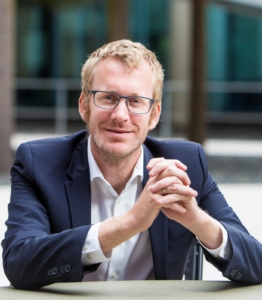 van Essen is Associate Dean of International Programs and Partnerships as well as a Professor within the Sonoco International Business Department at the University of South Carolina, Darla Moore School of Business. He currently teaches Business in Europe and Comparative Corporate Governance to undergrad students.
van Essen is Associate Dean of International Programs and Partnerships as well as a Professor within the Sonoco International Business Department at the University of South Carolina, Darla Moore School of Business. He currently teaches Business in Europe and Comparative Corporate Governance to undergrad students.
From 2017 to 2022, van Essen simultaneously served as the academic director of the Undergraduate International Business Major Program. He led the development of a new cohort program focused on Responsible International Leadership in partnership with ESSEC Business School in France. The cohort program provides students with the resources needed to become responsible, world-class leaders in the global workforce.
Business schools of the future should have more … “I would focus heavily on global partnerships and topics like climate change and inclusive growth. We must study these two phenomena to understand how they will affect business and society. Global partnerships will help every business school increase its impact because it leads to enhancements in the depth and breadth of our plans. The world needs more integration, not less.”
Tensie Whelan
New York University, Stern School of Business
Whelan is Clinical Professor for Business and Society and Founding Director of NYU Stern Center for Sustainable Business at New York University Stern School of Business. She has 25 years of experience working on local, national and international sustainability issues to engage businesses in proactive and innovative mainstreaming of sustainability.
 As President of the Rainforest Alliance, she built the organization from a $4.5 million to $50 million budget, transforming the engagement of business with sustainability, recruiting 5,000 companies in more than 60 countries. Her previous work included serving as Executive Director of the New York League of Conservation Voters, Vice President of the National Audubon Society, Managing Editor of Ambio, a journal of the Swedish Academy of Sciences, and a journalist in Latin America. She has been recognized by Ethisphere as one of the 100 Most Influential People in Business Ethics and was a Citi Fellow in Leadership and Ethics at NYU Stern.
As President of the Rainforest Alliance, she built the organization from a $4.5 million to $50 million budget, transforming the engagement of business with sustainability, recruiting 5,000 companies in more than 60 countries. Her previous work included serving as Executive Director of the New York League of Conservation Voters, Vice President of the National Audubon Society, Managing Editor of Ambio, a journal of the Swedish Academy of Sciences, and a journalist in Latin America. She has been recognized by Ethisphere as one of the 100 Most Influential People in Business Ethics and was a Citi Fellow in Leadership and Ethics at NYU Stern.
Business schools of the future should have more … “The business school of the future would be able to move nimbly, adding more contemporary content to the core and elective classes on a regular basis. Sustainability is part of the core as students learn how to deal with topics such as climate change, water scarcity, and inequality – which already have outsize impacts on business. And finally, the business school of the future recognizes that shareholder primacy and a sole focus on profits does a disservice to society and to business and its professors no longer teach it as the roadmap for healthy capitalism.”
Timothy Kundro
University of North Carolina, Kenan-Flagler Business School
Kundro is Assistant Professor of Organizational Behavior at University of North Carolina Kenan-Flagler Business School.
 His research focuses on the complexities of morality and ethics at work. In particular, he investigates how employees respond to and manage (im)moral issues in the workplace.
His research focuses on the complexities of morality and ethics at work. In particular, he investigates how employees respond to and manage (im)moral issues in the workplace.
Business schools of the future should have more … “I think many of the lessons we teach are applicable to the general undergrad population. Many students have the perception that business programs are training students for jobs in finance or consulting – and there’s certainly some truth to that – but I also think many of the approaches to critical thinking, answering questions, and solving problems are applicable to students who have other interests. Frankly, nearly everyone who graduates from undergrad is going to go on to work in some form of organization. So, finding ways to teach these lessons to a broader population would be beneficial.”
Beth L. Renninger
University of South Carolina, Darla Moore School of Business
Renninger is Lecturer and Director of the Center for Sales Success at University of South Carolina Darla Moore School of Business.
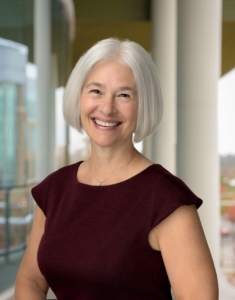 She has a background in corporate leadership, sales, marketing, and higher education. Her leadership style fosters a collaborative and inclusive environment, empowering individuals to excel and innovate.
She has a background in corporate leadership, sales, marketing, and higher education. Her leadership style fosters a collaborative and inclusive environment, empowering individuals to excel and innovate.
Business schools of the future should have more … “Relevance to contemporary work. Much of what we teach has been taught in the same way for decades yet work and business has changed dramatically. Required curriculum may have been tweaked, but not fundamentally changed. Workplace change is now accelerating even faster, and higher education especially has to quickly figure out how to adapt for relevance, define the value proposition for four-year residential learning, and adjust curriculum to be more flexible and personalized for today’s learners. Or the available substitutes will gain ground even faster. As Clayton Christensen said in the Innovator’s Dilemma, ‘we can either disrupt ourselves, or wait for the market to disrupt us.’”
Rhia Catapano
University of Toronto, Rotman School of Management
Catapano is Assistant Professor of Marketing at University of Toronto, Rotman School of Management and a research fellow at BEAR (Behavioural Economics in Action at Rotman).
 Her research explores how consumer psychology can be leveraged to benefit society. In one stream, she examines how people can be shifted away from entrenched views, and factors that affect receptiveness to the opposition. In another research stream, she explores the role of meaning in consumer satisfaction and decision-making.
Her research explores how consumer psychology can be leveraged to benefit society. In one stream, she examines how people can be shifted away from entrenched views, and factors that affect receptiveness to the opposition. In another research stream, she explores the role of meaning in consumer satisfaction and decision-making.
Business schools of the future should have more … “Emphasis on the idea that there are multiple routes to success and that it isn’t a race. I find students are so stressed about needing to figure out exactly what they want their careers to be, and feeling like if they don’t do the right internships now they will fall behind.
“In reality, 20-year-olds have so much time to explore and figure out what path they want to take. I spent a couple of years teaching English in South Korea after university. While it was happening, I felt like I might be wasting time and falling behind. In the end, I am so glad that I took that time away from school before committing to a career path, and I try to encourage my students to also explore paths that aren’t necessarily leading them to their long-term career immediately.”
DON’T MISS: 50 BEST UNDERGRADUATE BUSINESS PROFESSORS OF 2023 and WHY THIS SMALL PENNSYLVANIA SCHOOL IS LAUNCHING A CENTER FOR ENTREPRENEURSHIP & INNOVATION











Questions about this article? Email us or leave a comment below.